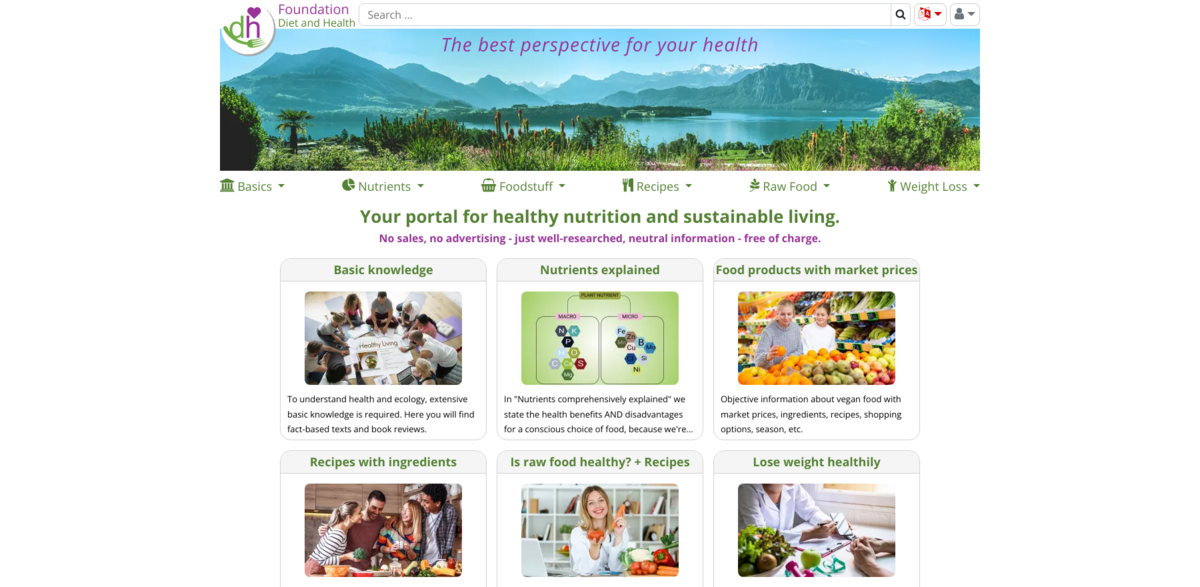What is the Foundation Diet and Health Switzerland?
Foundation Diet and Health Switzerland is your go-to portal for healthy nutrition and sustainable living. No sales pitches, no ads—just well-researched, neutral information that’s completely free. It’s all about understanding health and ecology through extensive basic knowledge. Here, you’ll find fact-based texts and book reviews that dive deep into nutrients, their benefits, and even their downsides, so you can make conscious food choices without any commercial pressure.
Main Benefits of the Foundation
Here are some key facts and figures that highlight the importance of this project:
- Provides objective info on vegan food, including market prices, ingredients, recipes, shopping options, and seasonal availability.
- Offers vegan recipes with detailed ingredient lists and nutrient-based selection options.
- Explains why raw food can be very healthy but also warns about common pitfalls due to misinformation.
- Guides on healthy, natural, and permanent weight loss, helping avoid the dreaded yo-yo effect.
- Promotes a plant-based diet as a way to maintain good health and support sustainability.
- References a 2016 study from the Proceedings of the National Academy of Sciences showing plant-based diets could cut food-related greenhouse gas emissions by 29–70% by 2050.
Understanding Health Beyond the Basics
The World Health Organization (WHO) defines health as a state of complete physical, mental, and social well-being—not just the absence of disease. Health and illness come from many factors, some beyond our control. Genetics play a role—some folks can get away with unhealthy habits longer than others before lifestyle diseases catch up. Still, a healthy diet, regular exercise, and enough sleep can make a huge positive difference. But it’s not all on us; environmental stressors like exhaust fumes, chemicals, allergens, and food contaminants also weigh heavily on the body.
The Environmental Impact of Our Food Choices
If you stick to the current standard diet, living a climate-friendly life is almost impossible. The food system is responsible for about one-third of all human-made greenhouse gases worldwide. This includes land use, agriculture, processing, packaging, and transport—each contributing significantly. To hit climate goals, fundamental changes in eating habits are essential, considering ecological, social, political, cultural, and economic factors. It’s a big picture thing.
Life Cycle Assessment and Ecological Footprints
Ever heard of “life cycle assessment”? It’s a standardized method to measure a product’s environmental impact from start to finish—cradle to cradle, as they say. This approach helps evaluate processes like production and disposal. Environmental compatibility is checked using tools like the CO₂ footprint, water footprint, and sustainability ratings. These calculations reveal the limits of Earth’s biocapacity, reminding us how crucial it is to live within those boundaries.
Project Impact on Sustainable Development Goals (SDGs)
- SDG 3: Good Health and Well-being
- SDG 12: Responsible Consumption and Production
- SDG 13: Climate Action
- SDG 15: Life on Land
- SDG 2: Zero Hunger (through sustainable food systems)
Why Planetary Health Matters
The term “planetary health” was coined by the Rockefeller Foundation – Lancet Commission in 2015. Eating a plant-based diet isn’t just good for your body and mind—it’s a vital step for the planet’s health too. By choosing foods that are kind to the environment, people can significantly reduce their overall ecological footprint. It’s about making choices that support both personal well-being and the future of the Earth. After all, our future depends on the actions we take today.


















